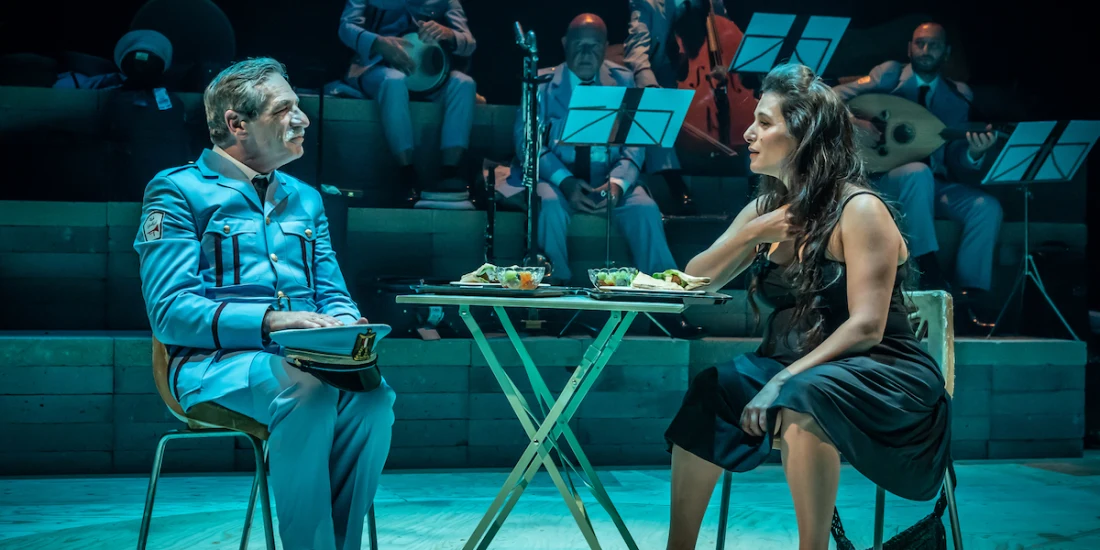'The Band's Visit' review — this exquisite gem of a show finds the extraordinary in the ordinary
Read our four-star review of The Band's Visit, the Tony Award-winning Broadway musical now premiering at the Donmar Warehouse in London to 3 December.
“Who can live without hope?” That’s the quietly profound takeaway from David Yazbek and Itamar Moses’s exquisite gem of a show, The Band's Visit, which swept the Tonys in 2018 – winning 10 awards, including Best Musical. An adaptation of the 2007 film of the same name, it’s a modest premise: in 1996, an Egyptian orchestra travels to Israel to play at the opening of a new Arab cultural centre, but accidentally wind up in a dead-end town instead.
A wry introduction downplays it even further, teasingly saying of this event “You probably didn’t hear about it. It wasn’t very important.” And, in the grand scheme of things, that might be true. But just by spending time with this small group of people, we witness the miraculous truth that you can find the extraordinary within the ordinary, that wider international conflicts melt away when you put human beings together, and that music and stories are the lifeblood of any community.
This happy accident stems from a mispronunciation: the band mean to travel to Petah Tikvah, and instead find themselves in (the fictional) Bet Hatikvah. That leads to the gloriously incongruous sight of the Alexandra Ceremonial Police Orchestra, in their perfectly pressed pale-blue uniforms, awkwardly milling around the dusty café of this desert wasteland – and gawped at by the idling locals.
The latter bemoan in song that this is a place where nothing happens: it feels like they’re “moving in a circle” laments one man, as he literally spins around on the stage’s revolve – one of numerous deliciously witty touches in Michael Longhurst’s meticulous production. But they’re not the only ones who are stuck, and, as the locals accommodate these strangers for the night, an unlikely exchange occurs that sets them all on a new path.
The most intense of these is between the buttoned-up conductor, Colonel Tewfiq Zakaria, and blunt café owner Dina. The former won’t even remove his hat initially; the latter is all frank, earthy sensuality and passionate outbursts. She even chops watermelon with furious abandon. But the mismatched pair begin to find connections: both are lovelorn and lonely, and they share a love of Arab culture. In the ravishing “Omar Sharif”, Dina recalls her adoration of the actor in the movies she watched as a girl – a song so suffused with longing and desire that you almost feel voyeuristic.
And yet that’s topped by the moment in which Tewfiq shows Dina how to conduct, in silence. Each has cracked the other open, and what passes between them is now beyond words. This dynamic is handled with tender dignity by Alon Moni Aboutboul, who gradually sheds Tewfiq’s gruff layers, and Miri Mesika, the Israeli superstar singer. The latter is simply a knockout: her voice is so rich, so velvety, that you get lost in its depths.
The subplots all have sweet moments and comic value, but are more variable. Most charming is the roller disco double date, in which the lothario trumpeter Haled (a suitably flirtatious Sharif Afifi) helps Papi (an endearing Harel Glazer) to overcome his romantic anxieties. Meanwhile violinist Camal and a local boy known only as Telephone Guy get into a hilarious stand-off over who has possession of the only payphone (Carlos Mendoza de Hevia and Ashley Margolis are a fantastic double act).
Clarinettist Simon confesses his writer’s block to host Itzik, his wife Iris, and her father Avrum (a great turn by Peter Polycarpou). The men bond over how music can fuel love, as Avrum recalls meeting his late wife, and Simon and Itzik start to inch forward in their lives. However, Iris gets the short straw: she’s written as grumpy and hysterical, when in fact her response is pretty reasonable: she works fulltime as carer, while her husband remains unemployed, and she also looks after their newborn baby and both men. Generally, the women – other than Dina – are underdeveloped here. A shame in a piece that otherwise takes such care with its characterisation; it slightly broke the spell for me.
But you forgive an awful lot thanks to the sheer wonder of Yazbek’s score, which mixes traditional Arabic music with Broadway ballads, rhythmic jazz and beguiling klezmer to stupendous effect. And the performers are equally phenomenal, especially woodwind player Andy Findon and percussionist Ant Romero. The boundaries blur between actor and musician, song and speech, and between languages and nationalities.
Soutra Gilmour’s set gives them free rein, with minimal furniture and stone steps at the back where the band congregate, while Anna Watson’s lighting smoothly shifts us into the intimate, confessional night where kindess, patience, just listening helps to unburden the soul, climaxing in the yearning plea of song “Answer Me”. Not much happens here – and yet everything happens. Captivating.
The Band's Visit at the Donmar Warehouse to 3 December.
Photo credit: Alon Moni Aboutboul and Miri Mesika in The Band's Visit at the Donmar Warehouse (Photo by Marc Brenner)
Originally published on
